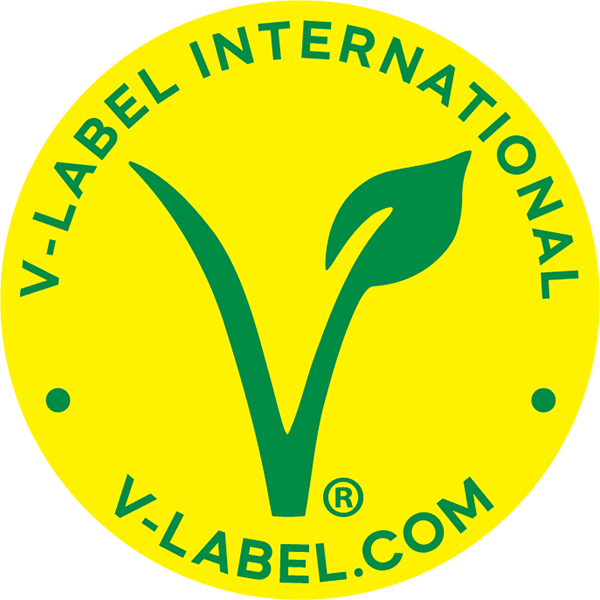The History of V-Label
Today, the V-Label for vegetarian and vegan products and services is the best-known label of its kind. How did this come about?
V-Label was born and used from AVI, the Italian Vegetarian Association in Italy.
V-Label (called the “leaf”) has been promoted as an international institutional symbol for vegetarian and vegan societies at the first European Vegetarian Congress, held in Italy, and is used since then in the Logo of the EVU.
Today’s V-label originated from the V (leaf) and was first used in Switzerland to certify products and services from Swissveg.
The V-Label was presented at the EVU-Congress, held in Switzerland, to start the European cooperation.
The network became worldwide thanks to the cooperation of V-Label GmbH and V-Label Italia.
The birth of the famous V
As early as the 1970s, today’s V with the leaf in the top right-hand corner began to be used as a symbol for the vegetarian lifestyle. The ”V” was first used in Italy from AVI as their organization’s logo. It became internationally known mainly through its presentation at the first European Vegetarian Congress in 1985. In the same year, the European Vegetarian Union (EVU) was founded and has since made the V an integral part of its logo. Today, an increasing number of institutions around the world use it as part of their logos, firmly establishing it in the vegetarian and vegan scene.
First certifications
In 1996, today’s Swissveg (at that time still under the name Schweizerische Vereinigung für Vegetarismus SVV) took the first step of also using the V for product declaration. In the following year, the first product line of meat alternatives bearing the V-Label came onto the Swiss market. An in-house brand of Migros, the largest retailer in Switzerland, the Cornatur product line became a great success with the support of Swissveg.
Internationalization
As President of both Swissveg and EVU, as well as the initiator of the V-Label, Renato Pichler presented the project at the European Vegetarian Congress in Switzerland in 1999. All organisations were invited to introduce the joint project into their country. Since then, there has been an increasing number of national certification bodies throughout Europe. Virtually all these organisations have now joined the V-Label project.
In order to emphasise the independent character of the V-Label, minimise the economic risk, and make the project sustainable in the long term, since 2008 the trademark rights have been managed by V-Label GmbH in Switzerland, which was founded specifically for this purpose. This was also necessary so that non-profit organisations could better participate in the project (in many countries legal and/or tax regulations prohibit non-profit organisations from administering quality seals). The very complex (and expensive) area of international trademark protection could thus be outsourced.
And since 2019, we have a cooperation with V-Label Italia.
Current situation
The V-Label is constantly evolving. All decisions are made in cooperation with the participating vegetarian and vegan organisations (e.g. Swissveg, ProVeg International, Vegan Society Austria, …). Since most of the certification work takes place locally in the individual countries, the majority of the income remains local (usually around 90 percent). In this way, inspection work can be carried out professionally and the local organisations supported. A small part of the revenue goes to V-Label GmbH in Winterthur to maintain brand protection and extend it to other countries and product categories. In addition, revenue from the V-Label funds international advertising and the operation of the international website and databases, as well as the coordination required to ensure that quality controls are equally strict in all countries. A contract with EVU ensures that the organisation’s international public relations and networks also benefit from the V-Label.
Future of the V-Label
In Europe, the V-Label has established itself primarily in the food sector. According to surveys from Switzerland and Germany, it has been the best-known label in this sector for years. The V-Label is currently also being introduced in the gastronomy and cosmetics sectors. Cleaning agents and other non-food products will follow.
At the same time, the label is also expanding outside of Europe, with demand for the V-Label particularly high in Latin America and Asia.
Win-win-win situation
The V-Label promotes local vegan-oriented organisations, innovative producers, and the European and international movement towards a plant-based lifestyle, and improves the life of all vegetarian and vegan people through a transparent and controlled certification process. It also promotes international cooperation between organisations. As such, the V-Label is one of the most valuable and successful projects of the worldwide vegetarian/vegan movement.
According to several surveys conducted in recent years in Central Europe, the V-Label is now the best-known label for vegetarian and vegan products. In Switzerland, 97% of vegans and 50% of the general population recognise the V-Label (for comparison: the vegan flower is only recognised by 15% of the population).

 Argentina
Argentina België (NL)
België (NL) Bosna i Hercegovina
Bosna i Hercegovina Brasil
Brasil Chile
Chile 中国
中国 Česká republika
Česká republika Colombia
Colombia Costa Rica
Costa Rica Danmark
Danmark Deutschland
Deutschland Ecuador
Ecuador España
España France
France Ελληνικά
Ελληνικά Hrvatska
Hrvatska Italia
Italia Lietuvių
Lietuvių 한국어
한국어 Magyar
Magyar Lebanon (EN)
Lebanon (EN) Melayu
Melayu Mexico
Mexico Nederland
Nederland Nigeria
Nigeria Norge
Norge Österreich
Österreich Perú
Perú Polski
Polski Português
Português Română
Română Русский
Русский Slovenčina
Slovenčina Türkçe
Türkçe South Africa
South Africa Suomi
Suomi Svenska
Svenska Schweiz
Schweiz Українська
Українська الامارات العربية المتحدة
الامارات العربية المتحدة Tiếng Việt
Tiếng Việt